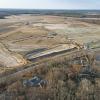Supreme Court hears argument in Artesian case

The Delaware Supreme Court recently held oral arguments on a case brought by a citizens’ activist group against Delaware Department of Natural Resources and Environmental Control over a construction permit for Artesian Wastewater Management’s spray irrigation fields on Route 16.
A three-justice panel reserved decision on the case; the panel could choose to hear oral arguments with all five justices present or issue a decision in favor of one party or the other. Both actions would typically take place within 60 days.
The case traces back to October 2013, when Artesian was issued a permit by DNREC authorizing construction of what was then known as the Artesian Northern Sussex Regional Wastewater Recharge Facility, later changed to the less unwieldy Sussex Regional Recharge Facility.
The facility was supposed to be a three-phase project intended to treat domestic wastewater from the proposed Elizabethtown development, located on a tract of land starting at the intersection of Route 16 and Route 30. Artesian’s permit was approved under DNREC regulations passed in 1999. However, the Elizabethtown project was never built.
In May 2017, Artesian sought to change its construction permit to instead treat commercial wastewater from poultry producer Allen Harim’s Harbeson plant. Artesian changed aspects of the facility design to accommodate accepting treated wastewater from Allen Harim. Those changes included building one 90-million-gallon storage lagoon instead of three smaller lagoons, and having the wastewater treated at Allen Harim’s facility instead of at an on-site plant built by Artesian.
In 2014, DNREC had changed its regulations to include more stringent testing for on-site wastewater treatment facilities. However, because Artesian had applied before those regulations were in place, the company was allowed to build the facility according to the 1999 regulations under which the permit was first approved.
The permit was challenged by the Milton-based citizens group Keep Our Wells Clean, which appealed to the state’s Environmental Appeals Board. Keep Our Wells Clean, represented by attorney Kenneth Kristl, argued that Artesian’s changes to the construction permit are substantial enough that Artesian should have to get a new permit based on the 2014 regulations
After two hearings, the board upheld DNREC’s approval of the permit. Keep Our Wells Clean then appealed to Delaware Superior Court, where the board’s decision was affirmed. Keep Our Wells Clean then appealed to Delaware Supreme Court, with oral arguments held Oct. 7.
The Artesian facility is built but not yet operational, so Keep Our Wells Clean cannot stop the facility’s construction; however, the group could force Artesian to go back and conduct more studies on the project’s environmental impact.
During his portion of the argument before justices Gary Traynor and James Vaughn and Chief Justice Collins Seitz, Kristl asked the court to consider two possible avenues if they should rule in the group’s favor. First, he said, the court could reverse the board’s ruling and remand it back to the board to determine whether DNREC must comply with the 2014 regulations.
The second option would be to remand the matter back to DNREC with directions to revoke the permit and not consider the application until further environmental studies are conducted.
Kristl said if the court remands the matter back to the board, it would mean another hearing in which further environmental studies may or may not be done. If remanded back to DNREC, the studies would have to be done.
For their part, Deputy Attorney General Kayli Spialter, representing DNREC, and attorney R.J. Skaggs, representing Artesian, say DNREC’s ruling in favor of granting Artesian’s permit should be upheld. They argue that the design changes to the facility are not significant enough to force Artesian to have to go back and seek another permit.
















































